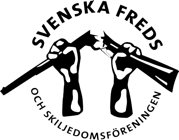It’s impossible to see the end of the exhibition hall inside the labyrinth of booths. Machine gun ammunition, warheads and armoured vehicles surround the swarm of sales people and government delegations that move around the alleys. A man is ready with his selfie stick, trying to catch the armoured car behind him. Next to two models of Bofors naval guns are two salesmen from the Swedish town Karlskoga. They have travelled to Abu Dhabi to market BAE Systems Bofors Swedish made weapons to the world.
– It’s like a meat show for vegetarians, the taller of the salesmen says and smiles at how alien the arms fair probably appears to someone not part of the business. They don’t want their names in print but they will gladly share their views and they have been to many arms fairs over the years.
– It’s the same in all types of business: car shows or airshows. It’s the same companies and people that travel around different countries. Only the products differ. It’s not odd, the salesman says.
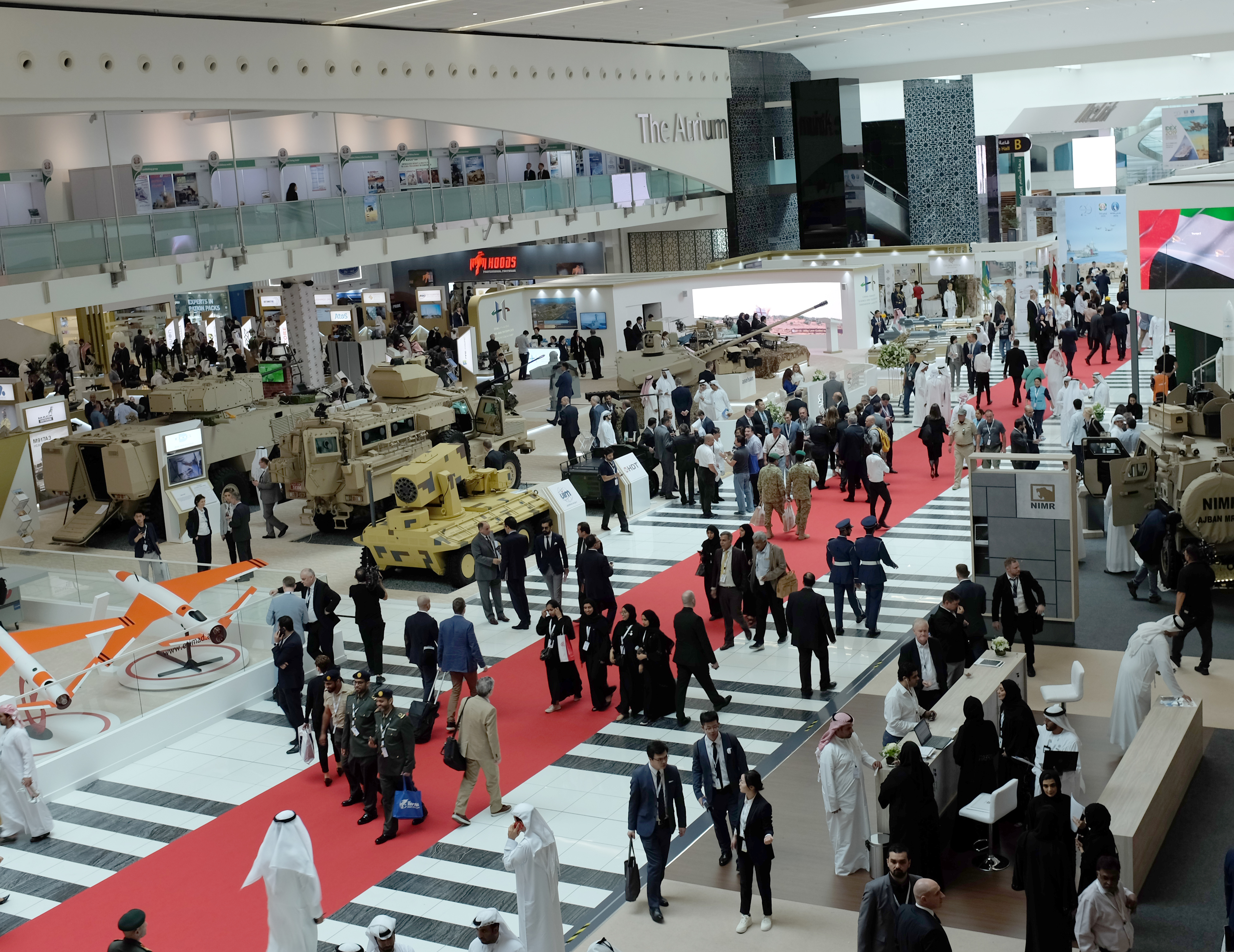
IDEX is short for International Defence Exhibition and Conference. It’s held every two years and is the only arms fair in the Middle East or North Africa to showcase military materiel for land, sea and air. As described at the IDEX website, it’s “a unique platform to establish and strengthen relationships with government departments, businesses and armed forces throughout the region”. More than 1500 companies are exhibiting this year, spread out over 133,000 square metres of event space.
The vast halls are packed with cruise missiles, automatic rifles, sights, radar systems, hand grenades and torpedos. But among the myriad of booths are also those showing off protective underwear, face paint in several colours, service stripes, camouflage fabric and freeze-dried food. Here, the booth of Swedish arms company Saab stands alongside the Belarus booth, and guided missiles stand next to anti-missile systems. If you were allowed, wanted to and had the money, IDEX has everything you need to equip your very own army.
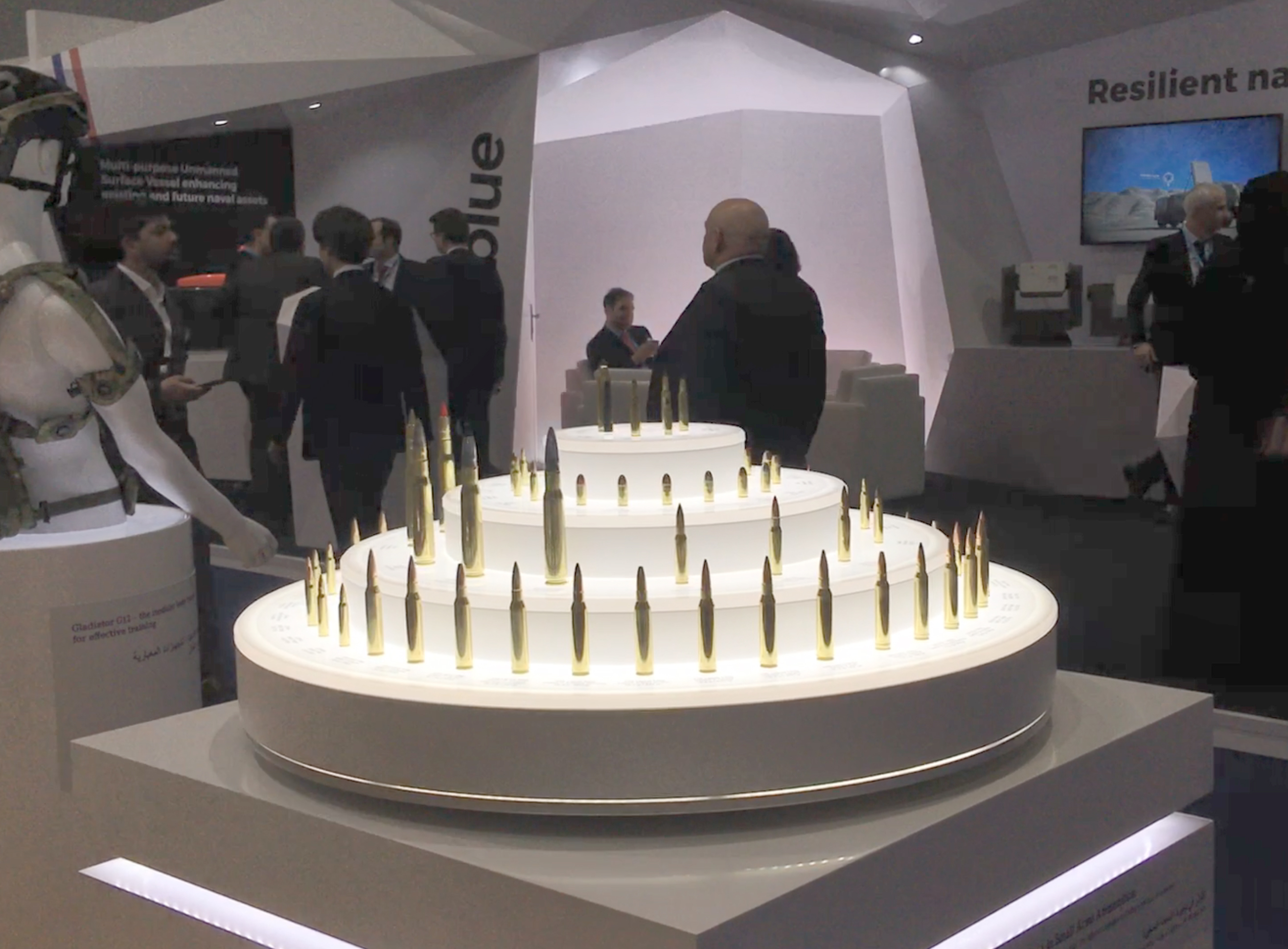
The Sudanese state owned arms company Military Industry Corporation, MIC, has one of the more spectacular booths of the fair. The company was founded in the 1990s in order to supply the Sudanese army with military materiel. But MIC is, as it states in the exhibition catalogue, “ready to meet the defence market needs” with artillery, explosives and military equipment.
MIC has gone all in at IDEX. A four metre high pyramid towers in the middle of hall D. It’s entrance guarded by two paper figures of the Egyptian pharaoh Taharqa and a sign saying “Working for Global Peace and Stability”. Next to the slogan, a white dove flies alarmingly close to the barrel of an AK5 – or if perhaps it’s meant to look like it is flying out of the barrel.
Nadir Gissmalla Mohammed Gissmalla works at the marketing department and shows Taka Y4, a multi rocket launcher system, placed on the sand coloured carpet. It used to have only 12 barrels, he says and pats them. Now it has 15. According to the sales brochure, Taka Y4 can be used against platoons of armoured vehicles, personnel in shelters or hidden troops. It can be mounted on, for example, planes, armoured vehicles and boats – but at IDEX the power cord is rolled up on the carpet.
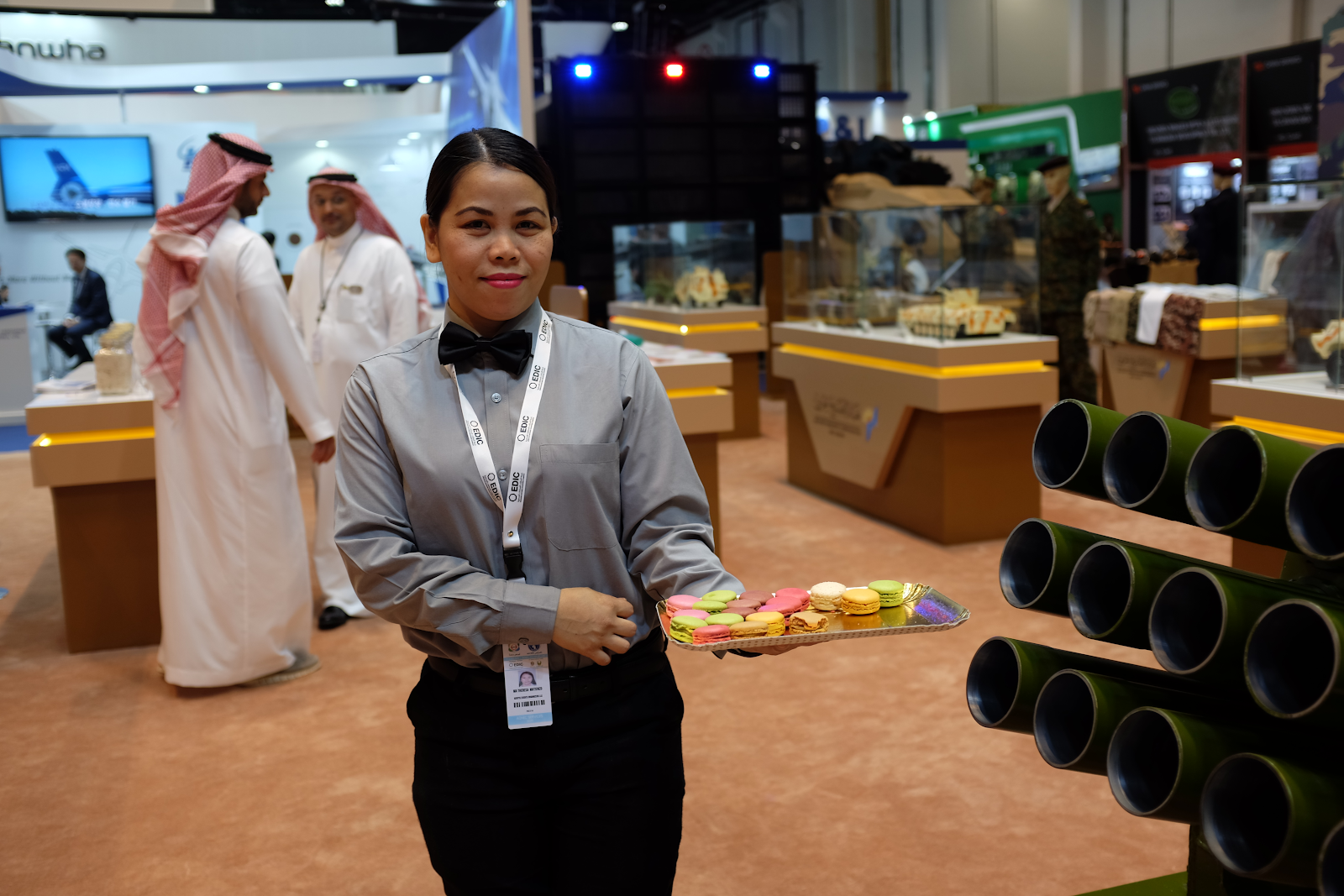
Buyers market
If this was a civilian market, many of the companies at IDEX – perhaps even most – would have been outrivaled a long time ago. It can be compared to when the pharmacy business in Sweden moved from state-owned to privatized: At first, there were lots of different private pharmacy companies wanting to get into the new market. Sometimes several different pharmacies crowded the same block in the big cities. As time went on, and the demand for prescriptions and toothbrushes wasn’t enough for all of them, they dwindled until only a few large players remained. But this is not how the arms market works. Exceptions make it possible for governments to support arms companies in their own country. Many companies can therefore survive even if there’s little demand for the products. This leads to what has been described as a buyers market, where sellers compete for buyer interest – using the best financial solutions, with government support in the form of loans and export credits, and with a story of how their products come with power, favourable relations to the seller state as well as economic and technological development in the buyer country. You have to be the most trustworthy, most reliable, most hi-tech, most battle proven and most adaptable to the needs of the buyer.
Perhaps this is why the Swedish Embassy is also at IDEX, in the shape of military attaché Martin Bergstrand and – at least part of the time – embassador Henrik Landerholm. Personnel from the Swedish armed forces, as well as from the military procurement agency FMV, are also present. Because there’s more to be sold here than just the products. Often, a sense of Swedishness and relations to Sweden are also on the table. During the years, Swedish arms have been marketed with Swedish specialties like bleak roe dinners, Swedish cinema, literature and design, royalties, Sámi yoik music, the historical ship Götheborg and Swedish pop music.
In order to attract the customer, it’s about building relations, the two salesmen at BAE Systems Bofors explain. It’s many years of work before you get accepted. As established on signs and flyers from the venue hotel: “Networking doesn’t stop at the show”, with an invitation to an Irish pop-up bar with live music on the 12th floor.
The importance of good relations is also a clear theme among the slogans that garnish the booth walls inside the fair. Partnership is high on the list of the most articulated values. For this fair, BAE Systems has chosen “Partnership in action”, French Naval group “Long term partner for your sovereignty” and the American arms giant Lockheed Martin “Partnering for security and prosperity”. Trust is another theme, visible for example in South Korean company C-RICHs slogan ”With BIG TRUST”. One emirate company is quite simply named “Trust”. More straight forward is Russian-Indian missile producer Brahmos slogan “Fast. Precise. Deadly”.
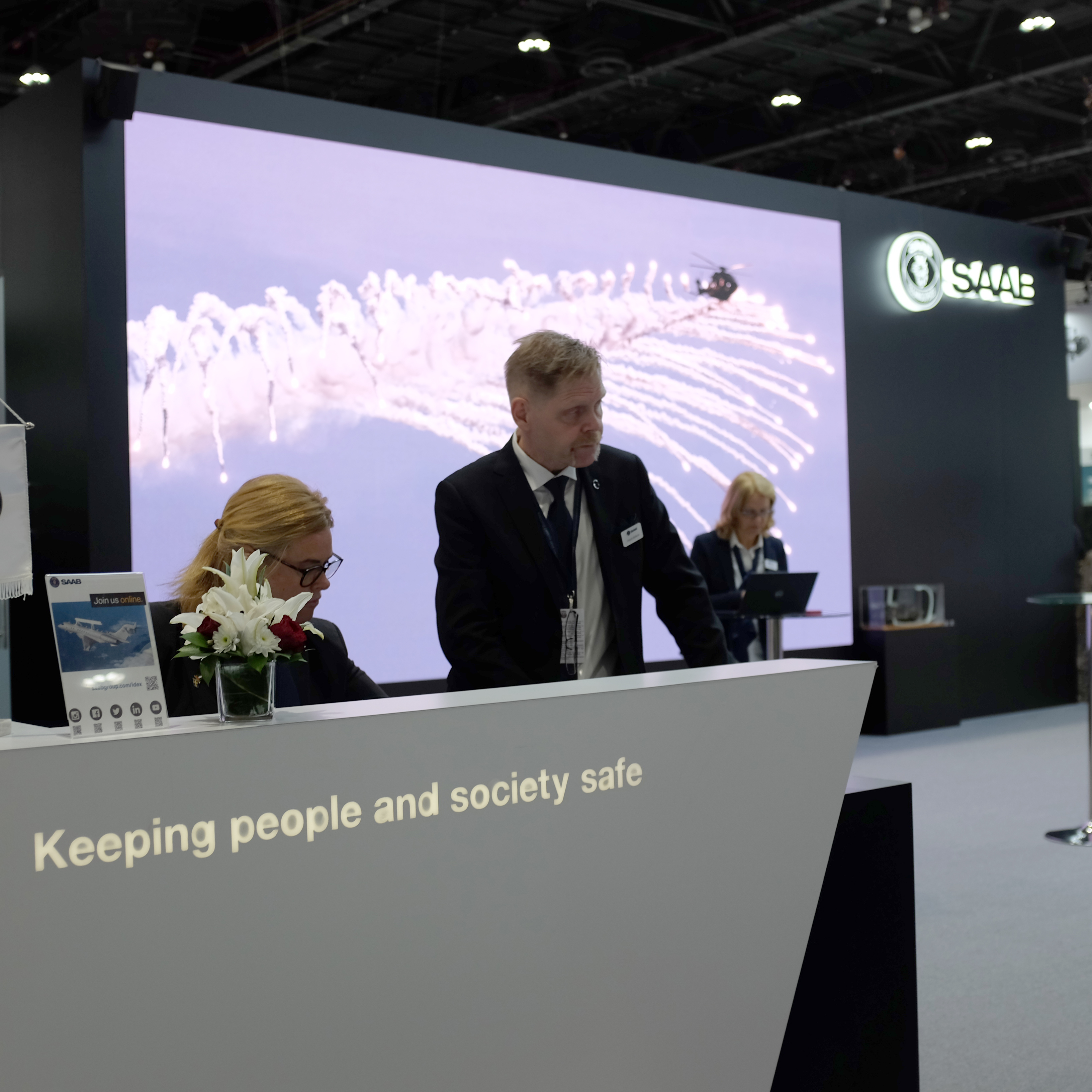
The Swedish arms company Saab has chosen “Keeping People and Society Safe” and the slogan is the first thing that greets visitors to the company’s booth. In the background, a slideshow with a photo of a glimmering Abu Dhabi skyline. All the approximately 20 employees that move around the exhibition wear pins with the Swedish and Emirati flag, clearly showing that they both invest in partnership – and in the UAE. The Saab Press Secretary in the booth, Conal Walker, does not want to answer questions regarding the company’s strategy at the fair, how they see the development in the region or the debate on arms exports in Sweden. Those questions are referred to the head office in Stockholm.
Just a few weeks before the fair opened, Sweden formed a new government, based on a multiparty 73 point agreement called the January Agreement. Besides the governing Social Democratic and Green Party, the agreement included The Liberals and The Center Party. A statement about the arms trade was one of the only foreign policy statements in the agreement. Point 70 says that the four parties’ principal stance is to not approve arms trade to undemocratic countries that are involved militarily in the conflict in Yemen, as long as the conflict continues. Since March 2015, The United Arab Emirates is one of the countries to take part in the Saudi led attacks and blockade against Yemen. The United Arab Emirates is a federation of seven emirates, in democracy indexes ranked as an unfree, authoritarian regime.
From the company headquarters in Stockholm, Saab Press Officer Ann Wolgers sends a statement via email . IDEX is one of many fairs that Saab takes part in every year, she writes, and it’s especially important because of the global target audience and that the visitors come from a multitude of countries.
The salesmen in the BAE Systems Bofors booth are more open to conversation; about the fair and about the politics of the trade. The company, based in the small town of Karlskoga, is now part of the American based BAE Systems Land and Armaments, owned by the British corporate group BAE Systems. It’s a “hair in the tail of this elephant”, as the taller of the salesmen describes it. The Swedish arms trade regulation doesn’t include marketing. The governmental agency in charge of controlling the trade (the ISP) is, however, informed of the companies market plans and can give an indication of whether the countries the companies are interested in would likely be approved (green country) or not (red country). Countries in the grey zone are labelled yellow. China is one example of a red country and Bangladesh is yellow, but that doesn’t stop them from visiting the booth. During the week, both Chinese and Russian visitors have entered the BAE Systems booth. The United Arab Emirates already have two 57 mm naval guns, the same kind that stand in front of us on the exhibition floor.
– These are not offensive weapons but are used for self defence. It’s nothing you can shoot on your population with, so to speak. You wouldn’t bring a boat to the town square, would you? Says the tall salesman’s colleague and continues:
– As soon as we talk about our products we say that arms trade from Sweden is forbidden. Our sales are the exceptions. The ISP decides which exceptions to be made. If the country is tidy enough, or however you put it.
As Sweden’s biggest arms company, Saab holds a special position – not least when it comes to getting export support from the government. The salesmen from Karlskoga agree, even though personnel from the Swedish Armed Forces occasionally join BAE Systems as part of governmental export support as well.
– Let’s say a yellow country comes along wanting to buy a lot of Jas Gripen fighter jets, the ISP might say no but the government will say yes. There’s too much tax money buried in the project, the taller of the salesmen says.
The Swedish Embassy in Abu Dhabi is half an hour by taxi from the event halls. The ambassador, Henrik Landerholm, serves coffee in cups imprinted with the Three Crowns, the national emblem of Sweden and a callback to his time as parliamentarian for the liberal-conservative Moderate party. During the week, he has participated as Saab signed an agreement further deepening the collaboration with the Emirati company Tawazun. He’s in close contact with Saab, every week, he says. But what is the Embassy’s role in export support?
– When it comes to the defence industry, I have, since I came to the UAE in September 2017, had occasional meetings with leading Emirati representatives. This is mainly because Sweden has a large defence industry company with large business activity in the country. This of course means that the value of the Kingdom of Sweden’s engagement is significantly bigger than it otherwise would have been, Henrik Landerholm says.
He’s clear: any business that receives the support of the Embassy is and has to be within the scope of the Swedish regulation for arms trade. But besides that, he does not differentiate between the Embassy’s support to arms trade and other business.
– The same principles apply. We are to advance Swedish companies and the Swedish industrial life in order to benefit the Swedish household, to create job opportunities and growth in Sweden. Regardless of if the business is defence industry or other companies.
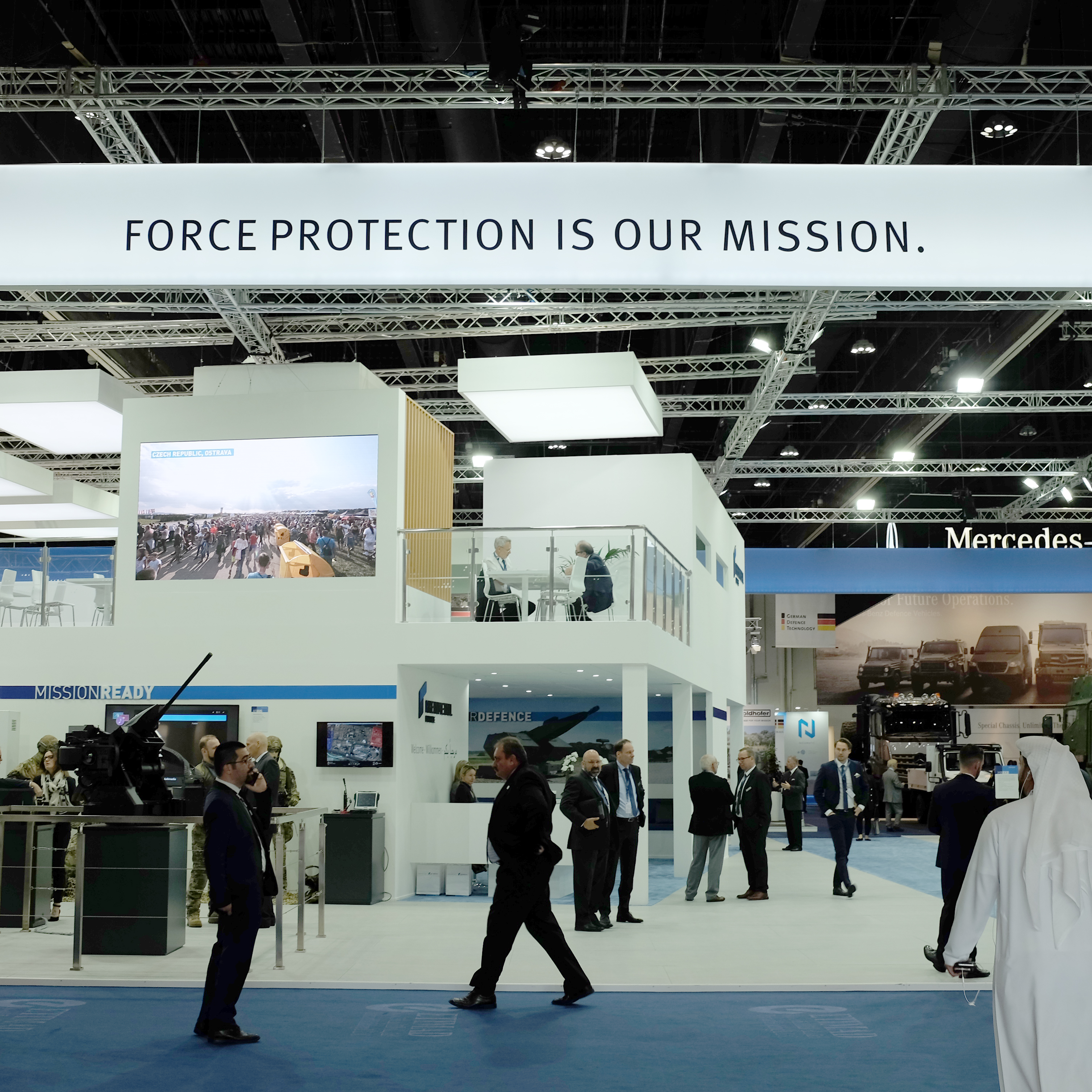
Back at IDEX, journalists are served pain au chocolat in the Media centre. A Ukrainian company holds a press conference presenting its line of military surveillance equipment in front of mainly empty chairs. The presentation focuses on the company’s conclusions from the battles between Ukrainian and Russian forces in 2014. It is a reminder of the real wars and conflicts that otherwise feels far away among the many alleys of tidy booths. Though, the only thing that really brings war to mind in the exhibition is Majid. He looks like the plastic torsos used in CPR courses, except he’s made especially for practicing catastrophic health care – his body covered with dark bruises and bloody cuts. The bone of a broken leg sticks out of one of them, the left foot pointing in the wrong direction in a way that hurts to look at. Blood drips from the wound until the compression bandage around his thigh is tight enough.
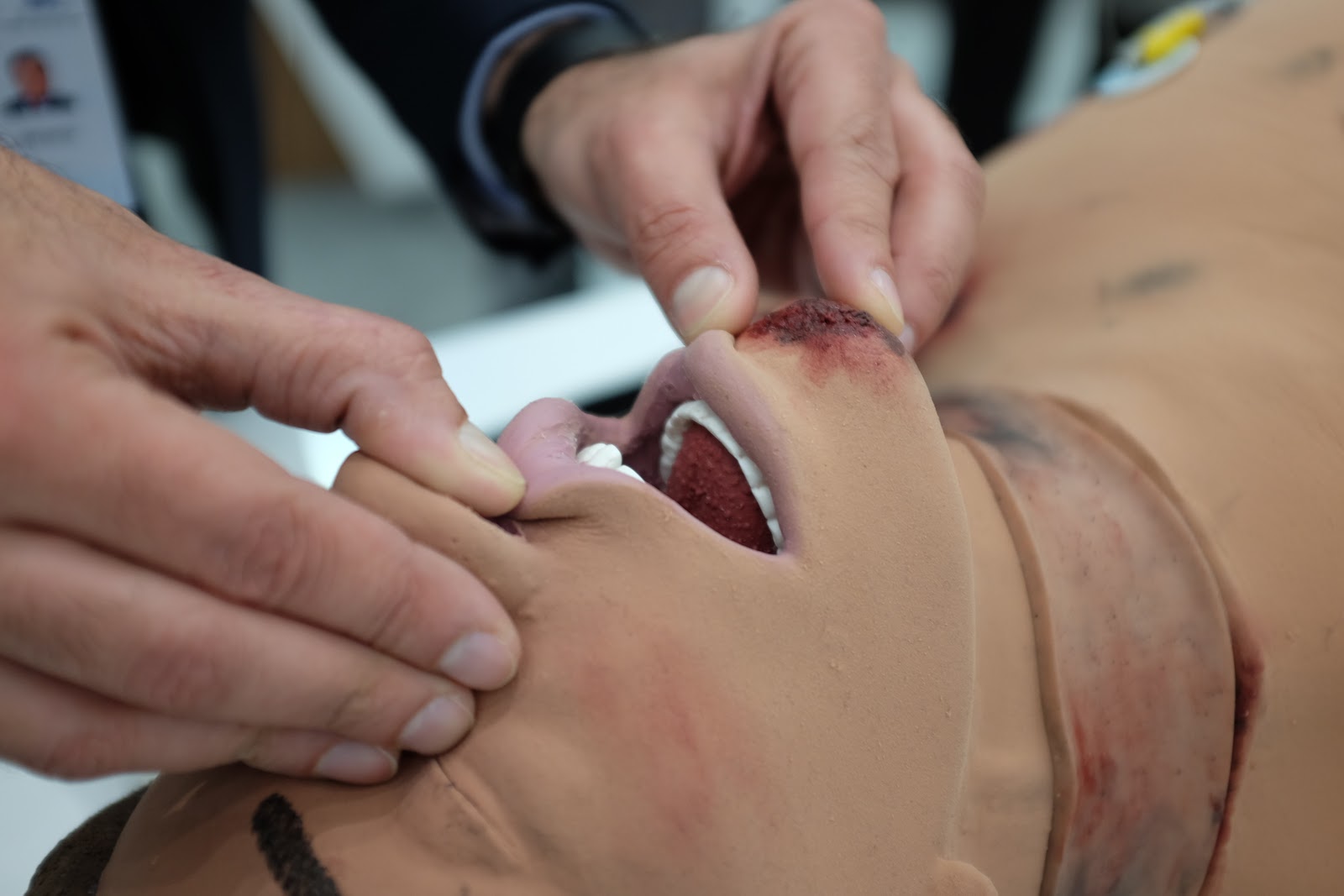
In the exhibition hall next to the one where Majid lies, one of the cafés is closing for the day. It is built like a military camp, its register placed on an orange oildrum, and a man in a camouflage T-shirt and cap wipes the makeshift tables. According to the menu, you can order Combat Quesadillas with Dynamite chicken, Sniper fries and Task force hot dog. The American company Northrop Grumman is also preparing to close, wiping off the missiles in the booth. The visitors move toward metal detectors at the exit.
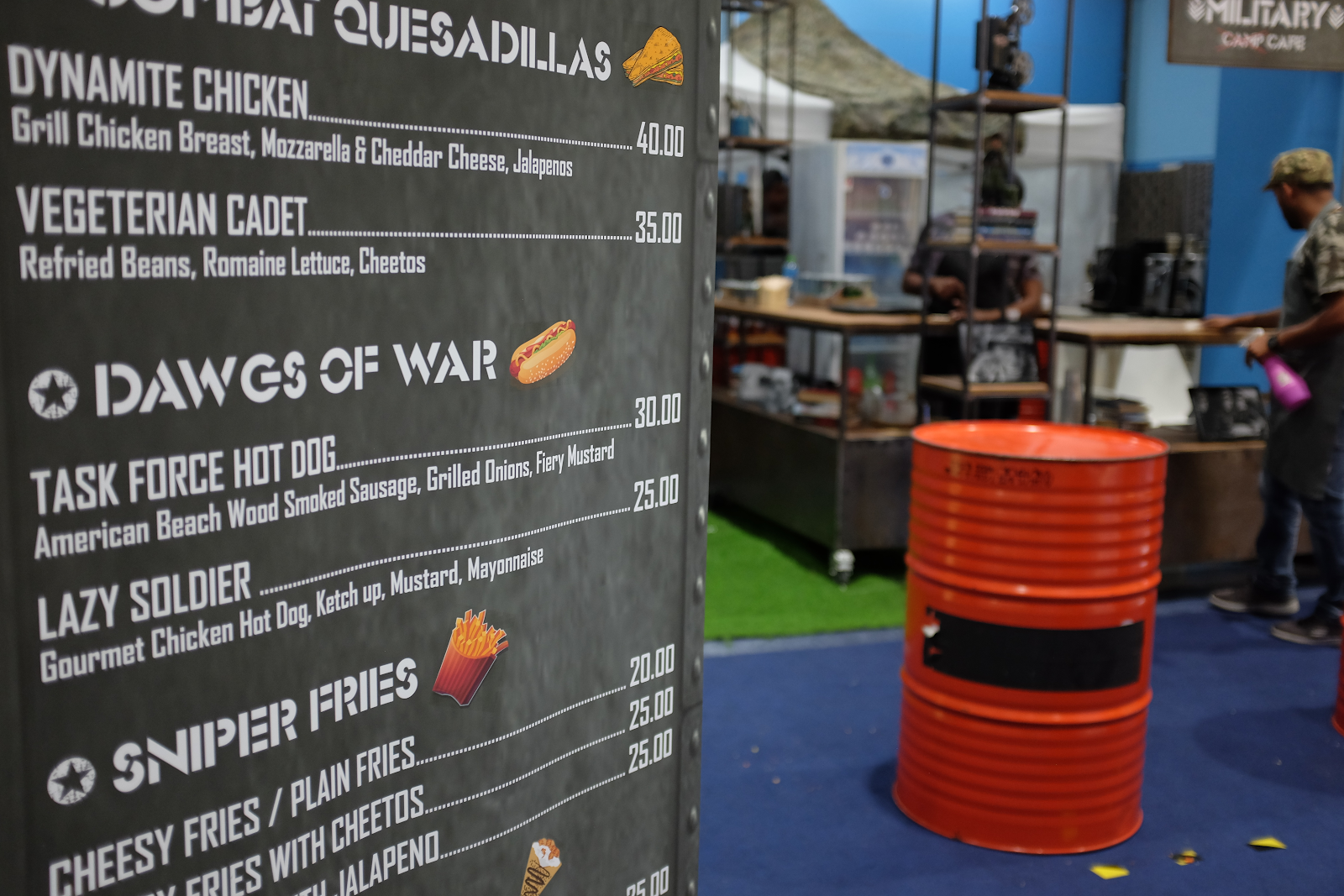
Just like everyday around this time, a military orchestra lines up in front of one of the entrances and traditional Emirati music soon echoes through the halls. The same band also played at the opening ceremony a few days earlier. The invitation states that Sheikh Khalifa bin Zayed Al Nahyan was one of the guests, the Emir of Abu Dhabi, president of the country and highest military commander of the Emirati army, as well as the emirate crown prince Sheikh Mohammed bin Zayed Al Nahyan. At the VIP section of the stand was also the Swedish ambassador.
The opening ceremony is repeated every day. During half an hour, visitors experience a video game-like war show played out to a soundtrack that sounds like it’s taken from the most intensive scenes of an action movie. The large outdoor arena has been turned into a sandy landscape, complete with sheds, run down stone houses and an old gas station. Groups of rusty oil drums lay scattered between plants and trees and several waterfalls cascade between large TV screens into an artificial lake.
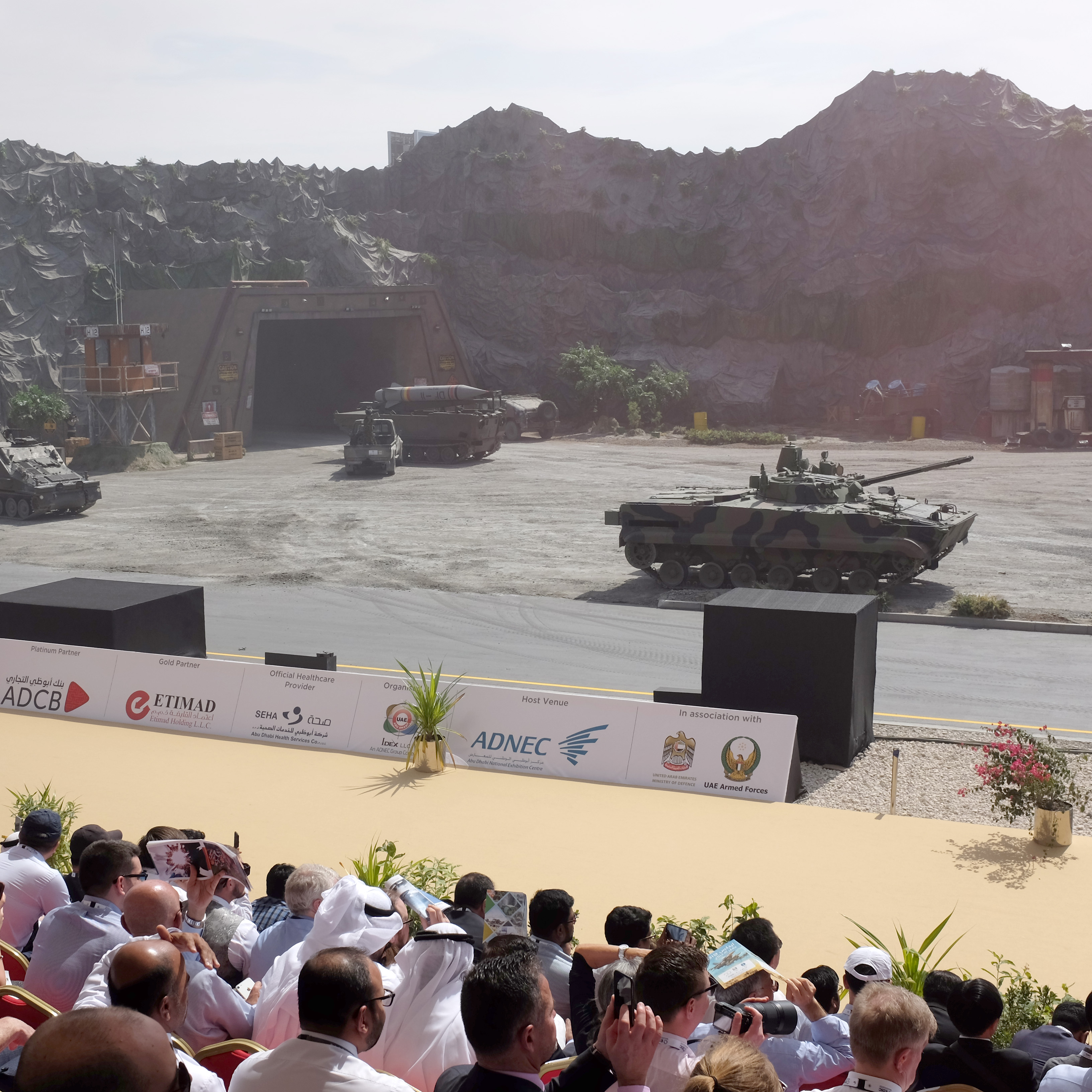
The audience members take their seats on a stand with room for over 1000 people, and open paper bags with sandwiches, juice boxes and earplugs placed on the red chairs. The show that follows includes a large number of fighter jets and helicopters. Groups of soldiers run across the arena, passing by armoured vehicles at high speed, are aided by what according to the speaker’s voice are “friendly hawks”, and disembark from military ships. During one occasion, the radar system Erieye – delivered to the UAE forces by the Swedish company Saab – passes over the textile and sand scenery. When all soldiers, boats, vehicles and airplanes have left the scene and the music has faded out, the landscape is empty again. In spite of extensive explosions and machine gun fire, no one seems to have been neither wounded nor killed in the scenario we have witnessed. Only a flock of humming drones, releasing smoke in the Emirati colours, are left hovering as the UAE first president Sheikh Zayed shows up on one of the wide screens holding a red rose – met with roaring applause from the audience.
The salesmen at BAE Systems Bofors have also seen the opening ceremony.
-They are very proud down here. We are more of a middle of the road kind of country, the taller salesman says, and continues -Cars are good but at the same time towns should be free from them. We should sell wood and birch furniture but not cut down trees for timber. The king is good but a president would also be good, but still we want the king to stay.
Arms exports are forbidden but we should still export?
-We respect the laws and regulations.
-I would also like a world free from arms but there is always a madman. If you can’t hit back you’ll get beat up, his colleague says.
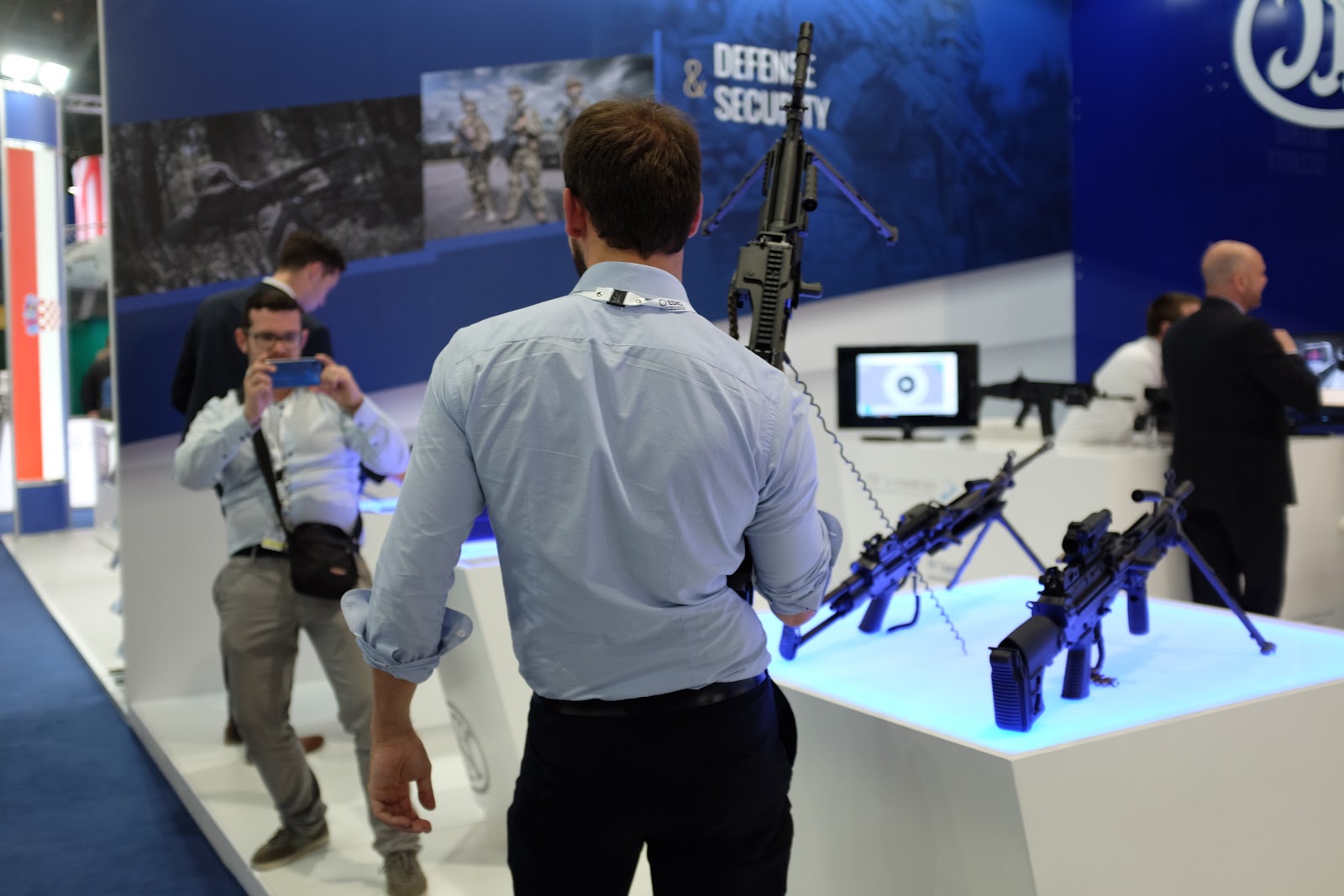
This article was first published in Swedish in PAX No 1. 2019. Translation by Linda Åkerström and Mitchell Cordner.
FACTS
Swedish companies at IDEX 2019:
Saab – fighter jets, submarines, surveillance, light weapons etc
BAE Systems Bofors – artillery, ammunition etc
Aimpoint – red dot sights
SSAB EMEA – armoured plate
Nammo – Norwegian company with production of ammunition and rocket engines in Lindesberg and Vingåker
Exensor – surveillance technology
DST Control – parts and technology for UAV:s
Roxtec – sealing solutions for cables and pipes
Other big arms fairs in the world:
Eurosatory, Paris
DSEI, London
Dubai Airshow, Dubai
Farnborough International Airshow, Farnborough
Innoprom, Ekaterinburg
Laad Defence and Security, Rio de Janeiro
Sofex, Amman
MSPO, Kielce Poland
